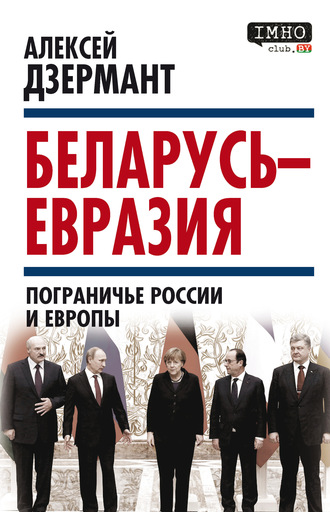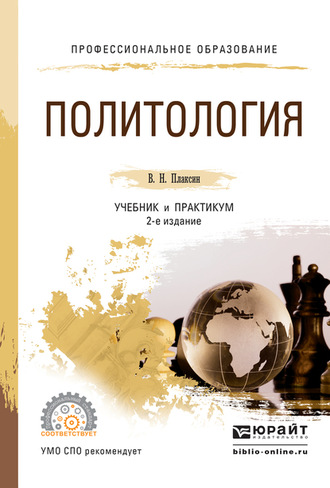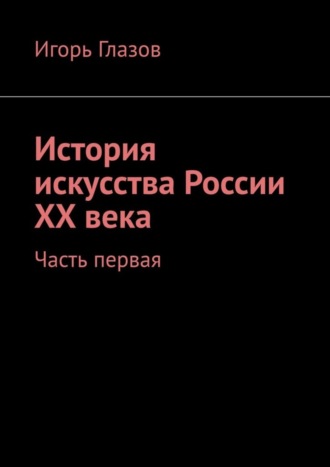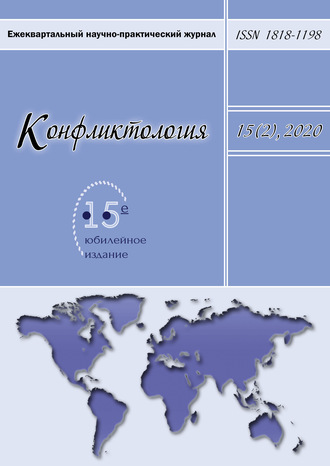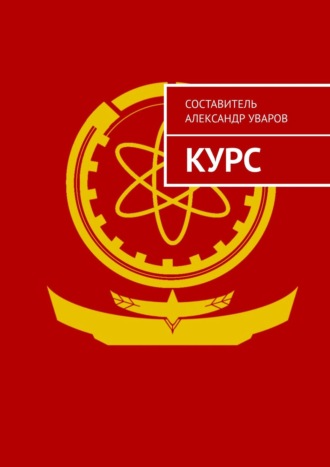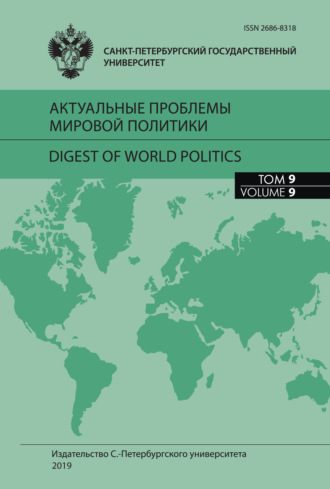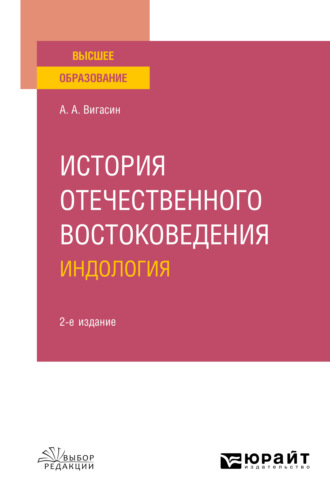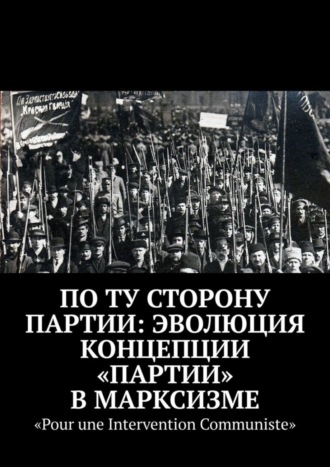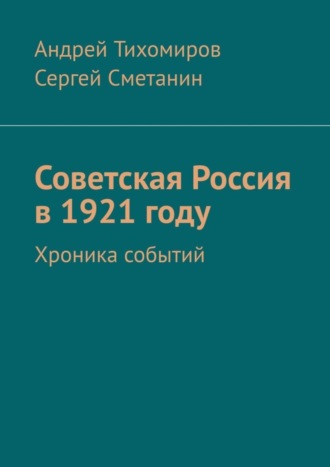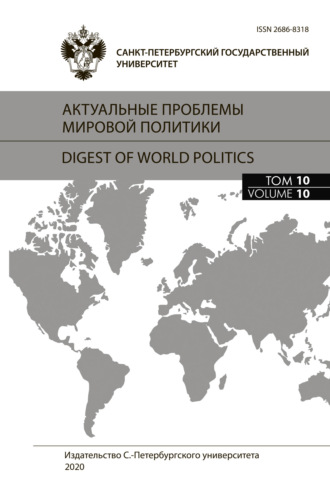политология
Будущее России
Евгений Примаков
Евгений Примаков – одна из ярких фигур на политическом олимпе России конца 90-х – начала 2000-х годов. Эта его книга – плод многолетних размышлений. Автор пристально анализирует место и роль России в современном мире, подробно останавливаясь...
Современная мировая политика
Коллектив авторов
В учебнике рассматриваются актуальные вопросы мировой политики. В первой части исследуются глобальные проблемы, анализируются новые вызовы, с которыми сталкиваются страны в последнее время. Во второй части представлен региональный срез мировой...
Конфликтология. Ежеквартальный научно-практический журнал. Том 15(1), 2020
Группа авторов
Журнал «Конфликтология» публикует статьи по теории конфликта и проблематике, связанной с различными отраслями конфликтологии, а также материалы по проблемам экспертизы, консультирования и практического регулирования социальных конфликтов,...
Прозреть. Осмыслить. Действовать! Национальная идея, время которой пришло
Игорь Соколенко
Книга для всех, кто жаждет духовного и экономического возрождения России в первой половине XXI в. В ней даны подробные ответы на два вопроса: кто виноват и что делать. Показана возможность инновационного развития всей межличностной системы...
Классовый Социализм
Владимир Иванович Краузе
Мне, как и многим, не нравится капитализм, когда он во главе государства, но и модели социализма Маркса, Ленина и бывшего СССР также считаю недодуманными и устаревшими. Поэтому предлагаю другой, надеюсь, более совершенный и современный вариант...
История британского флота. Том VI. Хроника побед и поражений
Уильям Клоус
Шестой том «Истории британского флота» охватывает период военных действий в Европейских морях, Индийском океане и водах Северной Америки в период с 1743 по 1756 год.
Путин. Правда, которую лучше не знать. Полная версия
Виктор Илюхин
Это последняя книга выдающегося российского политика, общественного деятеля и писателя Виктора Ивановича Илюхина.
Занимаясь в комитетах Государственной Думы вопросами коррупции, расходования государственных средств и безопасности России, он...
Народ без элиты
Юрий Мухин
В своей новой книге популярный писатель и публицист Юрий Мухин рассматривает историю той части общества, которая присвоила себе право называться «духовной элитой России». В книге показано, как эта прослойка жила и процветала в Российской...
Марксизм-ленинизм. Начальный курс
Алексей Брагин
Пособие содержит основные положения марксистско-ленинского учения. Оно предназначено для тех, кто впервые приступает к изучению марксистской теории. Пособие может быть использовано в системе партийной учебы.
В формате PDF A4 сохранен...
Беларусь – Евразия. Пограничье России и Европы
Алексей Дзермант
Пограничье, фронтир России и Европы, борьба за которое усилилась в последнее время, – один из самых взрывоопасных регионов мире, здесь не раз прокатывались опустошающие войны и сегодня он далёк от спокойствия. Конфликт на Украине, ставший...
Политология 2-е изд., испр. и доп. Учебник и практикум для СПО
Виктор Николаевич Плаксин
Учебник предлагает вниманию обучающихся наиболее устоявшиеся в политической науке точки зрения на рассматриваемые вопросы. В отдельных случаях приводятся различающиеся трактовки наиболее известных ученых. Издание включает тестовые задания для...
Экономические теории в пространстве и времени
Коллектив авторов
В отличие от естественных наук, где отвергаются теории, ложность которых доказана с помощью строгих экспериментов, объект экономической науки можно исследовать с помощью различных абстракций, ни одна из которых не может окончательно вытеснить...
История искусства России ХХ века. Часть первая
Игорь Глазов
Бурная динамика политической жизни России и особенности формирования ее художественной школы, приводят к тому, что в ХХ веке мир социальной утопии становится для России таким же источником формальных идей и вдохновения, каким был мир античности...
Смысл Кыргызстана. Кто мы? Зачем мы? Куда двигаемся?
Искендер Шаршеев
Эта книга – инструкция и манифест, рецепт, что делать дальше в стране, которая называется сегодня Кыргызской Республикой. Стране, которой нужна крепкая надежда и путь, чтобы остановить утечку мозгов и превратить страну в центр силы, в один из...
На перепутье. Сборник газетных публикаций 1997—2003 гг.
Александр Мовсесян
Многие предложения и идеи известного экономиста д. э. н. профессора А. Г. Мовсесяна по реформированию российской экономики, изложенные им в газетных публикациях 1998—2003 годов, не потеряли своей актуальности до настоящего времени и вполне могут...
Интернет: модель и практики политического участия
А. А. Киселев
В монографии рассматриваются теоретические и практические аспекты политического участия в интернете. На основе эмпирического исследования, проведенного в 2005—2007 гг., проанализированы ресурсы, факторы, формы и виды политического участия в...
Конфликтология. Ежеквартальный научно-практический журнал. Том 15(2), 2020
Группа авторов
Журнал «Конфликтология» публикует статьи по теории конфликта и проблематике, связанной с различными отраслями конфликтологии, а также материалы по проблемам экспертизы, консультирования и практического регулирования социальных конфликтов,...
Тайна улыбки Золотой Луны
Татьяна Браткова
Книга Т. Н. Братковой «Тайна улыбки Золотой Луны» показывает взаимодействие этнопедагогики, образования, науки в изучении родного и русского языков, роль многодетной семьи в жизни человека на примере жизнедеятельности члена Правления АН СМИ РФ,...
Ключевые идеи книги: Конец власти. От залов заседаний до полей сражений, от церкви до государства. Почему управлять сегодня нужно иначе. Мойзес Наим
Smart Reading
Этот текст – сокращенная версия книги Мойзеса Наима «Конец власти. От залов заседаний до полей сражений, от церкви до государства. Почему управлять сегодня нужно иначе». Только самые ценные мысли, идеи, кейсы, примеры.
О книге
С 1940-х...
Импортированные институты в странах с переходной экономикой. Эффективность и издержки
Коллектив авторов
Основными целями данной работы являются обоснование набора ключевых институтов, заимствование которых наиболее значимо для страны с переходной экономикой, а также определение условий, при которых это заимствование может быть осуществлено с...
Курс
Александр Андреевич Уваров
«Курс» является первым полноценным трудом, касающимся фундаментальных понятий социальной технократии. Предназначен для тех, кто хочет изучить и понять новую общественно-политическую идеологию – социальную технократию, ибо она – идеология будущего!
Актуальные проблемы мировой политики. Ежегодный альманах, том 9
Сборник статей
Девятый выпуск ежегодного Альманаха «Актуальные проблемы мировой политики» является междисциплинарным изданием по актуальным теоретическим и научно-практическим проблемам международной политики, отражает не только различные исследовательские...
История отечественного востоковедения. Индология 2-е изд., испр. и доп. Учебное пособие
А. А. Вигасин
Очерки А. А. Вигасина представляют историю классической отечественной индологии от ее возникновения до первой трети XX века. Значительную часть книги составляют архивные материалы, многие из которых впервые вводятся в научный оборот. Издание...
Великая Французская Революция
Николай Иванович Кареев
Сочинение талантливого историка и социолога Николая Ивановича Кареева, посвященное истории одного из ключевых событий XVIII века – Великой французской революции. Для широкого круга читателей.
Империализм как высшая стадия капитализма
Владимир Ленин
Работа В.И. Ленина «Империализм, как высшая стадия капитализма» не утратила своей актуальности до наших дней, хотя она увидела свет более ста лет назад. За годы, прошедшие после выхода в свет фундаментального труда Карла Маркса «Капитал»,...
Связь человека, общества и государства
Вячеслав Селянин
Эта книга о том, как менялись приоритеты общества и государства. В книге показано, что государство, человек и общество взаимосвязаны. Что государство должно уважать интересы всех слоев общества, а общество должно уважать законы государства.
Нарцисс в броне. Психоидеология «грандиозного Я» в политике и власти
А. В. Рубцов
Книга посвящена принципиально новой для нас теме политического нарциссизма. Явление, многим кажущееся знакомым и достаточно маргинальным, оборачивается одной из фундаментальных проблем всего нашего времени – эпидемией нарциссизма и династий...
Державець
Нікколо Макіавеллі
«Державець» (іноді перекладають як «Володар») – найвідоміший трактат флорентійського мислителя, дипломата, чиновника епохи пізнього Середньовіччя – початку Відродження Ніколо Макіавеллі. У книзі детально описано цілі і методи правління, відомі...
По ту сторону партии: эволюция концепции «партии» в марксизме
Дмитрий Шеметов
Анализируя эволюцию взглядов Маркса и Энгельса по данной проблематике и последующую трансформацию концепции партии Либкнехтом, Каутским, Лениным, Троцким, Бордигой, радикальные, но исторически ограниченные переформулировки, сделанные Р....
The World of Russian emigres in the late XX – early XXI centuries
Е. И. Пивовар
For the first time in the national historiography, an attempt is made to give a comprehensive analysis of the Russian emigres community as the most important part of the Russian world at the end of the 20th century and the beginning of the 21st...
Советская Россия в 1921 году. Хроника событий
Андрей Евгеньевич Тихомиров
Преодолев иностранную военную интервенцию 14 государств и гражданскую войну, инспирированную империализмом, Советская Россия вынуждено перешла к новой экономической политике (НЭПу) в труднейших условиях разрухи и наступившего из-за засухи и...
Советская Россия в 1920 году. Летопись России
Андрей Тихомиров
В 1920 году произошел окончательный разгром иностранной военной интервенции 14 государств и белогвардейских армий Колчака, Деникина, Врангеля, которые вооружались и субсидировались мировым империализмом, их целью было расчленение России. Страны...
Философия политэкономической справедливости. Путь к немарксистскому коммунизму?
Руслан Леонидович Богомолов
Рассуждения о справедливости на основе аксиом ВЫЖИВАНИЯ ЧЕЛОВЕКА и ЧЕЛОВЕЧЕСТВА в развитии общества и человека.Критика коммунистической теории марксизма.
Цивилизация Потопа и мировая гибридная война
Виталий Аверьянов
В книге известного философа и публициста Виталия Аверьянова, одного из создателей Изборского клуба, Русской доктрины и продолжающих ее десятков коллективных трудов представлены работы последних лет. В первую очередь, это вышедший весной 2020...
Записные книжки дурака. Вариант посткоронавирусный, обезвреженный
Евгений Сатановский
Евгений Сатановский – предприниматель и меценат, президент Института Ближнего Востока и профессор ИСАА МГУ, экс-президент Российского еврейского конгресса, журналист и писатель, ведущий популярной программы «От двух до пяти» на радиостанции...
Социология мировых цивилизаций: Западно-христианская цивилизация
Владимир Вольфович Жириновский
Данное издание предлагает вниманию читателя прикладную, или практическую социологию мировых цивилизаций – анализ свойств Западно-христианской цивилизации, как она проявляется в реальном измерении.
Путь к коммунизму
Денис Буренко
В книге описано историческое развитие общества. Начиная от первобытного общества, заканчивая коммунистическим обществом. Текст написан понятным языком и хорошо читается.
Ответ: Великая Шахматная Доска
Gradum Ante
Собственно, в названии «Ответ: „Великая Шахматная Доска“» вся суть данной книги. Факты, а не фейки должны определять процесс понимания сути. Посвящается России и ее гражданам.
Актуальные проблемы мировой политики. Ежегодный альманах, том 10
Сборник статей
Издание, посвященное Почетному профессору Санкт-Петербургского государственного университета Ватаняру Саидовичу Ягья. В течение всей жизни Ватаняр Саидович беззаветно служил отечественной науке и образованию, большая часть его профессиональной...
Конфликтология. Ежеквартальный научно-практический журнал. Том 15(3), 2020
Группа авторов
Журнал «Конфликтология» публикует статьи по теории конфликта и проблематике, связанной с различными отраслями конфликтологии, а также материалы по проблемам экспертизы, консультирования и практического регулирования социальных конфликтов,...
Конфликтология. Ежеквартальный научно-практический журнал. Том 15(4), 2020
Группа авторов
Журнал «Конфликтология» публикует статьи по теории конфликта и проблематике, связанной с различными отраслями конфликтологии, а также материалы по проблемам экспертизы, консультирования и практического регулирования социальных конфликтов,...
Параметры постамериканского миропорядка
Станислав Бачев
Пандемия коронавируса стала «последней соломинкой», которая приведет к изменению мирового порядка. Кризис 2020 года стал катализатором этих процессов. В книге говорится об однополюсном мире: США и все остальные. Такая модель отношений между...
Проектирование субкультур как основа тяжелого информационного вооружения
Павел Сапов
Почему в современном мире не упаковывают в продукт и не продают всему миру «счастье»? Почему торгуют только «свободой»? Все просто – будучи счастливыми, люди перестанут обслуживать интересы корпораций. Иными словами, обретут настоящую свободу, а...
Конкуренция или взаимодействие?
Павел Сапов
Сегодня российское общество, структурно представляет собой довольно атомизированную картину. Я отнюдь не сгущаю краски и бесконечно далек от критики людей, как проявления матушки-природы или создания Божьего – по отдельности все наши люди просто...
История экономики и экономических учений в кратком изложении ключевых событий
З. М. Назарова
Книга кандидата экономических наук, доцента кафедры экономики и обеспечения экономической безопасности Нижегородского института управления РАНХиГС при Президенте Российской Федерации З. М. Назаровой, результат более 25-летнего преподавательского...









